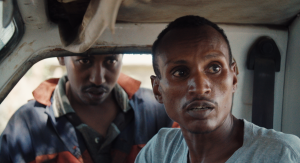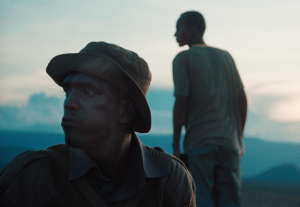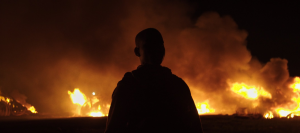“Out here, we’re all hunters.”

‘X’ looks on with Lukas as park rangers come up the street.
In the darkly cinematic and beautiful When Lambs Become Lions, moral lines are crossed again and again in the fight for survival in the northern plains of Kenya. Following the stories of cousins Asan and X, and X’s poacher Lukas, Emmy-Award-winning director Jon Kasbe shows the poaching industry from both sides of the field.
Asan is a park ranger, protecting the elephants from poachers who would kill and steal their ivory: poachers like his cousin X and Lukas. Where Asan has not been paid in months as a park ranger, and any coming paycheck is far off, X and Lukas are doing well in the ivory broking industry. Though you can tell X has conflicting feelings he keeps to himself about his profession, he says that in his world, it is either risking your life every day to be well off or working odd jobs that may be available. Focusing on the complexity of the elephant poaching problem, Kasbe shows how morality can become complicated when it is up against means of survival.

‘X’ and Asan together in the plains.
Through the highly cinematic approach of the film, it is still easy to forget that this is all real life and that what you’re seeing is not a narrative film. Beautiful shots with an atmospheric score give shine to this otherwise dark, dirty, and ugly story about the poaching of elephants. Showing shots of the beautiful, natural Kenya, and editing it against the shots of the corpses of elephants, or of Lukas making poisoned darts have a juxtaposing effect that really works. Through gaining trust of his subjects, Kasbe was able to get deeper stories and become more immersed in the world of poaching. He had said during a Q&A that since he was so close with the subjects, he had questioned his own morality while filming them on their hunts but would, at times, end up rooting for them as they worked to not get caught by the rangers on their trail. In the editing of this film, a thriller vibe is present as you hang on the edge of your seat while the poachers are running from the rangers, or as youhang in the balance with Asan as he tries to figure out hisfamilies own means of survival when a new baby is introduced.

Asan holds one of his children as his wife gives birth.
Kasbe shows X and Lukas watching on in their small home as in a theatrical display of power, the Kenyan president Uhuru Kenyatta burns ivory harvested from brokers and poachers work as much as $150 million. Even being against poaching, it is easy to feel empathy for these subjects as they see what they risk their lives for, to provide for their families literally goes up in flames.

The harvested ivory burning in piles, as ordered by the Kenyan president.
Kasbe’s cinematic perspective of the alternative side of the poaching the public will never see (and hopefully should never, because poaching is still BAD), but When Lambs Become Lions works in creating a sort of empathy for his characters. Morally, much of the audience at Mountainfilm appeared opposed to the poaching X and Lukas committed, but still asked worried questions about their family, their futures, and where they were now.

Recent Comments